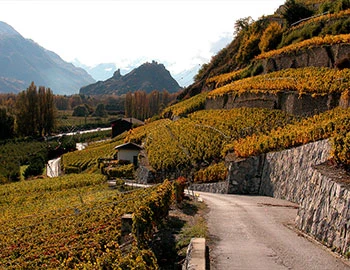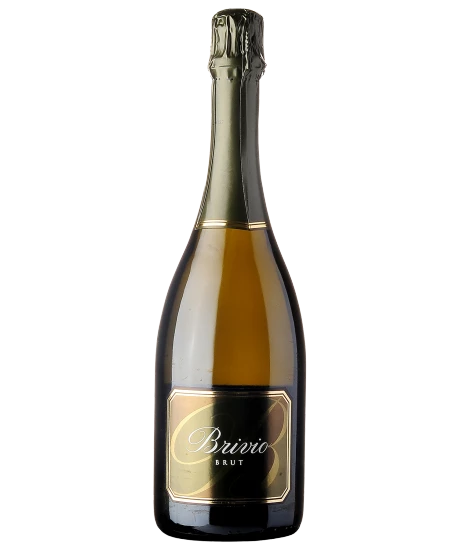
Brivio Brut Spumante
IGT Ticino, Brivio, 750 ml

| Grape variety: | Pinot blanc, Merlot |
| Producer: | Brivio / Gialdi |
| Origin: | Switzerland / Tessin / Sottoceneri |
Description
The Ticino Spumante brut reveals on the nose delicate fruity aromas of apple and a basket of citrus fruits. The palate is coated with a fresh and fruity aroma. A delicate almond aroma comes into play. The delicate mousse and elegant perlage make you want to take the next sip.
Attributes
| Origin: | Switzerland / Tessin / Sottoceneri |
| Grape variety: | Pinot blanc, Merlot |
| Ripening potential: | 2 to 7 years |
| Drinking temperature: | 8 to 10 °C |
| Volume: | 13.0 % |
| Note: | Contains sulphites |
Brivio / Gialdi
For most of wine lovers in Switzerland, the name Guido Brivio is no unknown. However, abroad, it is a different story. Only after many years in the trade has he become among the wine experts and professionals of New York or London an insider tip, so to say, from an infinitesimally tiny unknown corner in the great international wine world.
Although Guido’s grandfather was a wine merchant, he didn’t grow up in this industry, or even on a wine estate. At home, life didn’t revolve around grapes, but artichokes! His mother and uncle jointly possessed the Swiss production rights for Cynar. Only after studying business in London did the young Guido decide to study oenology in Bordeaux. His mother was delighted, as she saw that a certain family tradition could now continue. There then followed a stay in Sonoma Valley, California, where he became acquainted with American wine producers’ carefree, adventurous way of working.
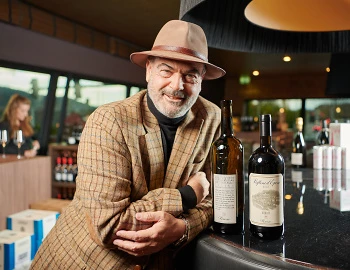
Merlot
Everybody’s darling
Merlot is the most charming member of the Bordeaux family. It shines with rich colour, fragrant fullness, velvety tannins and sweet, plummy fruit. It even makes itself easy for the vintner, as it matures without issue in cool years as well. This is in contrast to the stricter Cabernet Sauvignon, which it complements as a blending partner. Its good qualities have made the Merlot famous worldwide. At over 100,000 hectares, it is the most-planted grape in France. It also covers large areas in California, Italy, Australia and recently in Eastern Europe. The only catch is that pure Merlot varieties rarely turn out well. Its charm is often associated with a lack of substance. Only the best specimens improve with maturity. They then develop complex notes of leather and truffles. This succeeds in the top wines from the Bordeaux appellation of Pomerol and those from Ticino, among others.
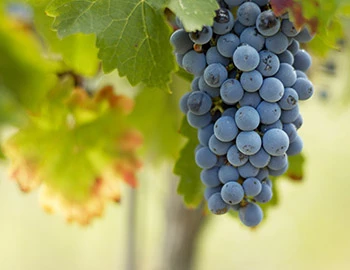
Pinot blanc
Lively sparkling, substantial white
The Pinot blanc has the same genetic fingerprint as Pinot gris and Pinot noir. They only differ in colour. The mutation from red to white was noted over a century ago in Burgundy. Suddenly, berries of differing colorations were hanging on the same stock. The bouquet of the Pinot blanc is fresh and floral with notes of citrus, apple, pear and apricot. In Alsace, it yields fragrant sparkling wines; it also enters into some champagnes. Vintners in Germany and Austria produce an abundance of Pinot blanc with a good deal of substance, blending and backbone. Representatives from Switzerland demonstrate a similar profile. There, the Pinot blanc grows mainly in Valais, Vaud and in Grisons.
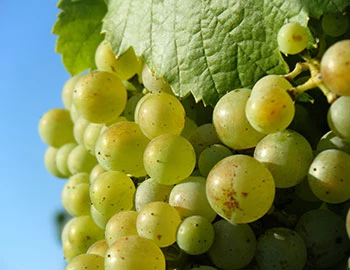
Tessin
Ticino: the Merlot Mecca of Switzerland
Ticino winegrowing is thought to date from Roman times, as early as 2000 years ago. But the foundation for today’s viticulture was laid just over 100 years ago, in 1907. It was then that the first Merlot vines were planted at Castelrotto in Malcantone. Since then, the variety has emerged triumphant here. Top selections matured in barriques more than measure up to those from Bordeaux’s Saint-Émilion or Pomerol regions.
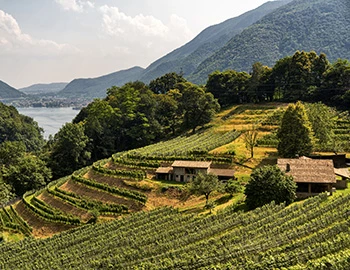
Tessin
Ticino: the Merlot Mecca of Switzerland
Ticino winegrowing is thought to date from Roman times, as early as 2000 years ago. But the foundation for today’s viticulture was laid just over 100 years ago, in 1907. It was then that the first Merlot vines were planted at Castelrotto in Malcantone. Since then, the variety has emerged triumphant here. Top selections matured in barriques more than measure up to those from Bordeaux’s Saint-Émilion or Pomerol regions.

Switzerland
Switzerland – A small country with enormous diversity
Switzerland is famous for its banks, watches, and cheese, but not necessarily for its wine. The Swiss didn't invent wine, but they have been extremely open and curious to it. Wine culture arrived in what is now modern Switzerland via several routes: from Marseilles to Lake Geneva and the Lower Valais region; from the Aosta Valley through the Great St. Bernard Pass to the rest of Valais; from the Rhone through Burgundy, across the Jura Mountains to Lake Constance; and from Lombardy to Ticino, and then on to Grisons.
